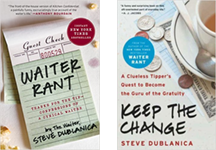“So, what do you do?” the well-heeled man asked me.
I was in the middle of munching on a canapé so I held up a finger and continued masticating. As I did so I remembered that, in France, it’s considered rude to ask people what they did for a living. But we weren’t in France.
After washing down my tidbit with a sip of champagne, I answered. “I’m the social services guy for my town. Run the food pantry, help people with the electric bills, stuff like that.”
“Professional do-gooder, huh?” the man said.
“Have halo, will travel.”
“Tell me,” the man said, “Do the people who go to your place deserve the help they’re getting?”
“I don’t understand what you mean,” I lied.
A smug look played across the man’s face. “I mean, do you ever see people loading up on food and driving away in a Cadillac?”
“It happened once,” I said. “But it was an old Cadillac.”
“Lots of those people cheat the system,” the man said. “Welfare queens you know.” Those people?
“A small group of people cheat,” I said. “But most of my clients work, often two jobs.”
“Do you check them out? Run financials?”
“Yep.”
“Do you have a cutoff?”
“Everything is on a case by case basis.”
“And our tax money is paying for all this?”
“Actually,“ I said, “Taxes only fund my salary . Everything else is donated. The food, the money, everything.”
“You don’t say?”
I nodded.
“But by helping people out,” he said. “Don’t you think you’re perpetuating their sense of victimhood? Teaching them someone always going to bail them out?”
“That I’m making the problem worse?” I said.
“Yes.”
“I’ve heard that argument,” I said. “But it’s an abstraction. I don’t deal in abstraction. I deal with people.”
“You’re ducking the question.”
“Probably,” I said, shrugging.
“I worked hard for everything I have,” the man said. “I don’t like my tax dollars promoting idleness. Too many people today with their hands out, gaming the system.”
“Rich people game the system too,” I said. “Remember those landlords in Manhattan who got tax breaks for not jacking up the rents on moderate income families but then charged full market rates anyway? That’s sort of like welfare fraud.”
“But in many cases,” the man said. “That was perfectly legal.”
“So that’s okay?”
“It’s legal. A businessman would be a fool not to take advantage of the breaks the law provides him.”
“But those very same landlords depend on fire and police services,” I said. “But they make it so those people can’t afford to live in the city they serve.”
“What can I say? Life isn’t fair.”
“True,” I said. “But it could be fairer.”
“If only wishing would make it so,” the man said, smiling as if he had scored a point.
“Is that how you made your money?” I asked. “Wishing you’d be successful?”
“Like I said, I worked very hard to get where I am.”
“Did you make sacrifices?”
“Of course.”
“Making life fairer for people requires hard work too, “I said. “And sacrifice. Wishing never made anything so.”
“So, you’re telling me it’s wrong to be successful?”
“Not at all. But do we need 20,000 square foot homes when 10,000 would do nicely? Or a billion dollars when 500 million would suffice?”
The man snorted. ““That sounds like class warfare to me.”
“Ever hear about a billionaire named Chuck Feeney?” I said. “Made his fortune in duty free shops?”
“No.”
“I think he’s still alive,” I said. “Gave like 99% of his money to charity. Said he hopes that last check he writes bounces. Wants to die broke.”
The man said nothing.
“Listen.” I said. “I’d like a little more money for myself too. But there’s got to be a point where enough is enough. Too many people are poor when they don’t have to be.”
“How old are you?’ the man said.
“Fifty.”
“And still idealistic,” the man said, shaking his head. “You’re probably too old to learn any better.”
“True,” I said. “But when we reach the end, everything we know or think we know will burn away like summer grass in a wildfire.”
“I don’t get it.”
“Don’t worry,” I said. “Neither do I.”


I hate these types of people, the ones who don’t give any thought to how circumstances imor even birth can defeat the most self-made of self-made men. The notion of any type of privilege must be completely foreign to him.
I saw a typo in “I don’t understand THAT you mean.” Otherwise,this was an astute piece.
Thanks for the free proofreading! 🙂
Brave to try to explain it to him Steve. But it probably went right over the guys head.
When the argument “It’s legal. A businessman would be a fool not to take advantage of the breaks the law provides him.” is made, I’ve found that nothing I can say will be listened to after that. You’re a good man, Steve, and with far more patience than I possess, but I will remember the Chuck Feeney anecdote!
The weird thing is, isn’t welfare and the food bank (while funded by donations) are also legal? So what’s the problem here?
The businesses take advantage of tax breaks, and the poorest ones take advantage of food banks. I don’t get where this other guy is coming from.
I would have told the guy that many of the people you help work harder than he does. You can work your ass off and still be poor.
I’d also have been tempted to point out the hypocrisy when he defends taking advantage of breaks in the law but doesn’t want any breaks for people who actually need them.
BTW, Chuck Feeney gave away the last of his fortune at the end of 2016.
I’d like to believe that people can change but sometimes I wonder. A perfect example of someone with a closed mind.
Where have you been all this time?
So, you got to meet Trump? Interesting conversation 😉
I was not aware of Mr Feeney. Thanks.
In France, it is not rude to ask people what they do for a living. What is rude is asking them how much they make…
This is an interesting piece.
My only question is why a thoughtful person such as the writer wasted his valuable time talking to someone like his “interlocutor” — to use a more neutral name than I’d like.
I would have said near the start of the conversation “Our views are very different. I don’t think interrogating mine will be very informative and you’re entitled to your different opinion.”
This is not meant sarcastically at all — I really thought the writer was casting pearls before [his interlocutor].
You are a patient man to discuss logic with a willfully blind “self-made” man like that. We all had people that helped us. It is horrible because it isn’t about the behavior of the poor, it is about him creating a mental barrier to fear. If he feels like bad things happen to those who “deserve” it, then he feels safe in an unstable world. He also feels justified in greed, arrogance, and selfishness because he is a cut above. It is a shame he can’t see past his illogical arguments and facts. If he looses everything to a twist of fate, it will be a hard fall.